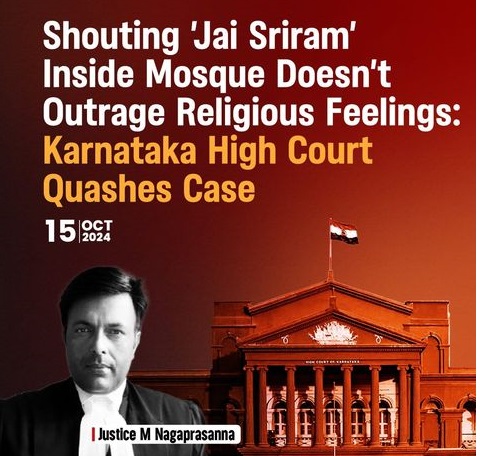By Anwarulhaq Baig
NEW DELHI: In a surprising ruling, the Karnataka High Court quashed a criminal case against two Hindu men accused of shouting “Jai Shri Ram” inside a mosque and allegedly threatening the Muslim community, stating that it cannot hurt religious sentiments, a decision that has ignited nationwide controversy and prompted prominent citizens to question whether courts are now permitting Muslims to chant “Allahu Akbar” in temples as well.
The case originated from a complaint lodged by Hydhar Ali C.M., who alleged that he and the head of a mosque in Mardala, Kadaba taluk in Dakshina Kannada encountered the two men shouting the contentious slogan as they exited the mosque’s compound on their two-wheelers. According to the complaint, Keerthan Kumar and Sachin Kumar not only shouted “Jai Shri Ram” but also allegedly threatened the community, leading to heightened tensions.
Hearing the writ petition of Keerthan and Sachin, who challenged the complaint filed against them, a single-judge bench of Justice M. Nagaprasanna observed in its order, “Section 295A deals with deliberate and malicious acts intended to outrage the religious feelings of any class by insulting its religion or religious beliefs. It is understandable how, if someone shouts ‘Jai Shri Ram,’ it would outrage the religious feelings of any class. When the complainant himself states that Hindus and Muslims are living in harmony in the area, the incident by no stretch of the imagination can result in animosity.”
However, eyewitness accounts claimed the incident was captured on CCTV, suggesting it was a deliberate act by unknown miscreants to incite discord among communities that have historically coexisted peacefully. The complaint asserted that the actions of the two men were an attempt to disrupt communal harmony. But Justice Nagaprasanna dismissed the allegations, stating that there were no substantial grounds in the complaint to support the charges against the petitioners. This decision has left many questioning the judiciary’s stance on such provocative incidents.
When India Tomorrow sought a reaction to the Karnataka High Court’s decision to dismiss the case against those who chanted “Jai Shree Ram” in a mosque, Dr. Syed Qasim Rasool Ilyas, spokesperson for the All India Muslim Personal Law Board (AIMPLB), cautioned that this ruling not only encourages communal frenzy but also supports such reprehensible actions.
Dr. Ilyas expressed his surprise and sadness that the Karnataka High Court, in its ruling, underestimated the seriousness of barging into a mosque at ten o’clock at night, threatening those present, and shouting “Jai Shree Ram.” He emphasized that the slogan “Jai Shree Ram” is not merely a religious chant but is currently being used as a tool for communal hatred, tension, conflict, and disruption in society. He stated that chanting such slogans in the place of worship of another religion is unacceptable in any context.
Stating that courts should consider the intention behind any such communal action, Dr. Ilyas urged the judiciary to examine the underlying motives for entering someone else’s place of worship late at night and chanting slogans. He clarified that Muslims worship and serve only one God and do not associate anyone with Him and mosques are built for this purpose. “If a Muslim were to enter a temple or any other place of worship of another religion and start chanting ‘Allahu Akbar,’ would the people present there tolerate it? Would the court’s judgment be the same then?” he asked.
Former chairman of Delhi Minorities Commission Dr. Zafarul Islam Khan, who is also president of the All India Muslim Majlis-e-Mushawarat (Registered), questioned whether the judge was granting Muslims the license to chant “La Ilaha Illallah” in temples as well. He pointed out that many judges are attending Sangh Parivar meetings and associating with Hindutva organizations, which leads to such rulings and observations. Asking whether Muslims can be permitted to chant “La Ilaha Illallah” in temples, Dr Khan criticized the ruling as “very irresponsible.”
In response to the Karnataka High Court’s ruling, various individuals, including several members of the Hindu community, expressed their surprise.
Ganesh Kumar reacted, “’Allahu Akbar’ inside the temple also does not hurt the religious feelings of Hindus, as per the order.”
Ajoy Dharmavaram questioned, “I expect the Hon’ble Mr. Justice M. Nagaprasanna would adjudicate the same if someone were to enter a temple shouting ‘Allahu Akbar.’ Or would he consider that it would ‘outrage the feelings of a class of people’?”
Ophthalmologist Ajay Kamath added, “Why would anyone want to go inside a mosque and shout ‘Jai Shree Ram’ unless they intend to create an altercation?”
Advocate Sanjoy Ghose reacts, “This Hon’ble Justice of Karnataka High Court states in his judgement that he fails to understand how if someone enters a mosque and shouts “Jai Shri Ram” it would outrage another class of people! Oscar Wilde had once said “I am so clever that sometimes I don’t understand a single word of what I am saying.”
Activist Bhavika Kapoor asks “What’s your opinion on this judgement? Deliberate? 1. If shouting Jai Shri Ram in a mosque is acceptable then shouting Allah o Akbar in Ram Temple or Vaishno Devi or Tirupati temple should also be acceptable.Agree? 2. Sanghi judges need to be identified and slammed.”
Prominent Muslim woman activist from Hyderabad, Ms. Khalida Parveen, stated, “Communal judges will give communal judgments to please their masters in hopes of securing a #RajyaSabhaChair after retirement.”
Gauri Fatima commented, “They don’t like to use their own slogans in their own worship places. They are obsessed with mosques. They know that even Ram would like to be called into mosques, as he also prayed to one single God.”
Asif Damda remarked, “Let this judge handle a case of a Muslim shouting ‘Allahu Akbar’ in a temple and see what his judgment would be.”
The Indian American Muslim Council also expressed its concerns.





